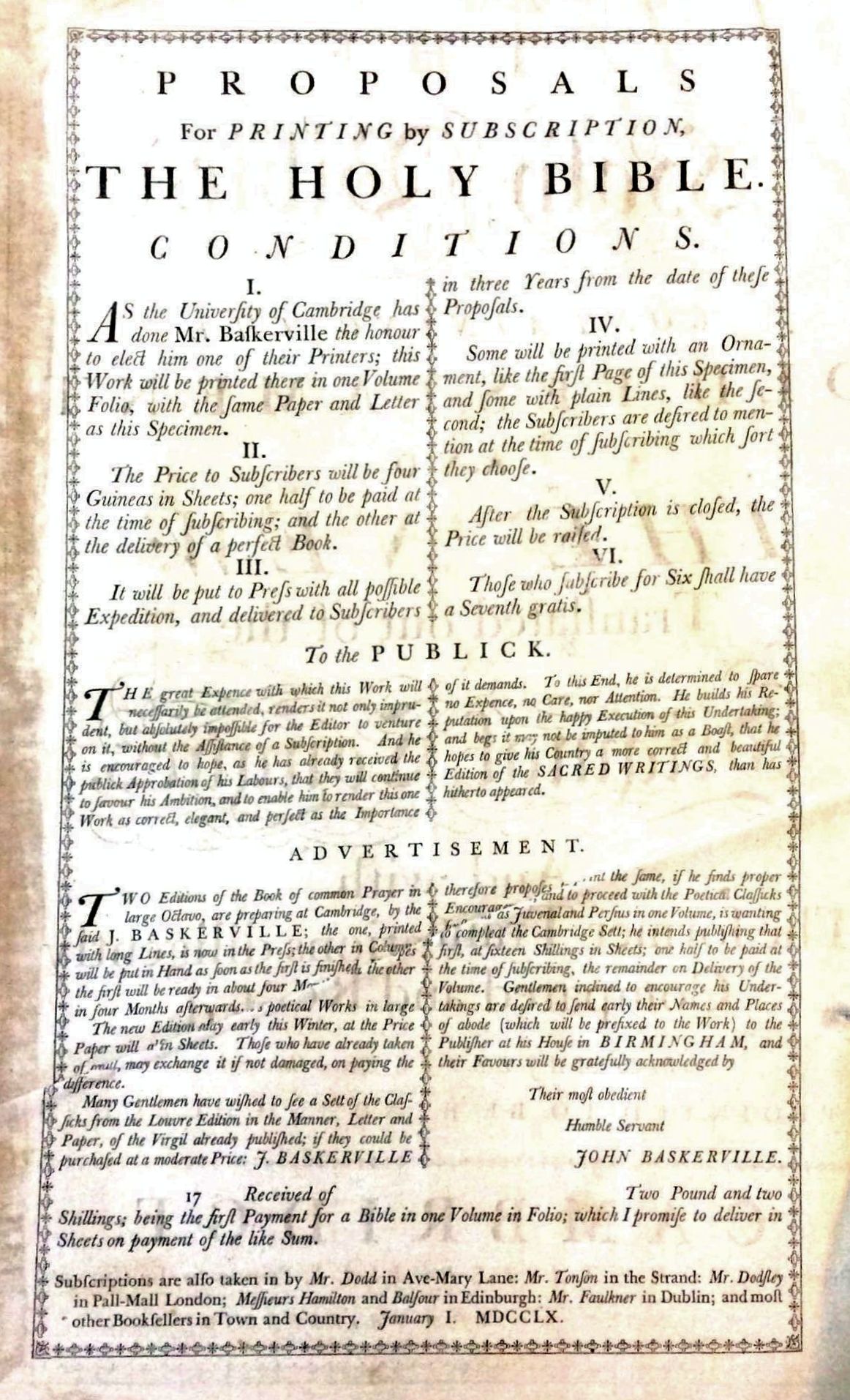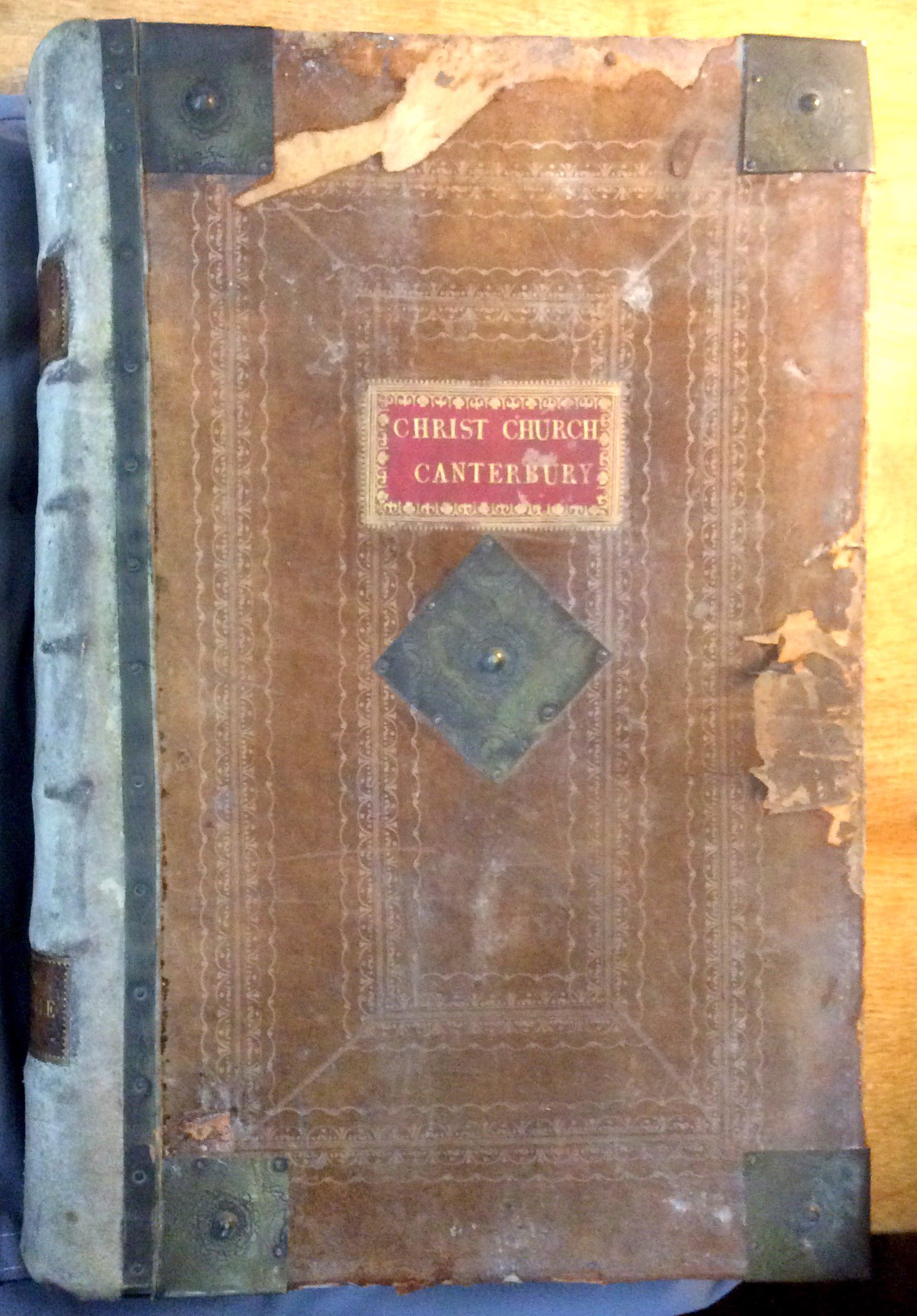Canterbury Cathedral Library’s five copies of the 1763 Baskerville Bible
In 1758 John Baskerville, a Birmingham printer and businessman, decided to launch a project to print a large folio Bible, of the sort needed for lecterns in churches, using a new typeface which he had designed. This new type had caused a great stir in 1757 when he used it to print an edition of the poems of Virgil on expensive wove paper.

In 1759 Baskerville produced a specimen sheet for his Bible showing the layout of the proposed title page and the design of a page of the text, together with a call for subscribers to invest in a copy of the planned edition. This prospectus for printing the Bible was re-issued in 1760; a copy has been discovered in the Cathedral Library, tucked inside a completed Bible owned by one of the subscribers.
The production of this new Bible was a very long-drawn-out business: it was not completed until 1763. Printing Bibles was a monopoly granted by the crown to the two universities of Oxford and Cambridge and to the King’s Printer in London. Baskerville paid Cambridge for permission to print his Bible and he moved his press from Birmingham to Cambridge. When the Bible eventually appeared in 1763, the imprint on its title page declared that it was ‘Printed in Cambridge by John Baskerville, Printer to the University’.
The Baskerville Bible was printed on huge sheets of imperial paper, giving a page size of 49 x 33 cm.

It might be asked why the Cathedral Library holds five copies of this edition of the Bible. The only other British library to hold as many is the University Library of Baskerville’s home town of Birmingham, according to the English Short-Title Catalogue database (ESTC) at the British Library, which tries to record all English printing up to the year 1800. [1] In fact, only one other library in the world has more copies listed in the database: the famous Houghton Library at the University of Harvard which owns six. The ESTC record states that Baskerville printed 1,250 copies of his great Bible; 117 surviving copies are listed in the ESTC, so the Cathedral Library has 4·3% of all recorded copies (or 1 in 250 of the entire print run).
Shelfmark W/D-7-36
This copy was purchased by the Cathedral a year after publication for use on the Eagle lectern. The Treasurer’s Book for 1763/64 records its purchase in November 1764: [2]
 Mr Smith the Bookseller’s Bill for a new Bible for the Eagle Baskerville [£]5-5-0
Mr Smith the Bookseller’s Bill for a new Bible for the Eagle Baskerville [£]5-5-0Thomas Smith was a Canterbury bookseller and printer who had a shop in the city centre.

By the end of the century the Dean and Chapter seem to have replaced the Baskerville Bible with a newer edition; the book was placed in the Chapter Library (listed in the Cathedral’s 1802 printed catalogue at the shelf mark AA.ii.77). This copy is substantially bound in heavy leather-covered boards with protection in the form of brass corner and centre bosses and a brass strip along the edge of the spine; it has a red leather label on the front board, tooled in gold letters reading ‘Christ Church Canterbury’.
Shelfmark W2/X-12-5
This copy is bound in gold-tooled brown leather with marbled endpapers. It has ownership inscriptions on the second front free endpaper reading: ‘WM Baskerville, the gift of Col. Thos. Baskerville’ and ‘This book was presented to the Library of the Dean & Chapter of Canterbury by Miss Baskerville, of Hearne, June 1875.’ Colonel Thomas Baskerville, who died in 1817 does not seem to have been related to the printer: the shared surname seems to be just a coincidence. Miss Baskerville of Hearne who gave this copy to the Cathedral Library in 1875 was presumably a later member of the colonel’s family.
The colonel himself died childless [3]. Miss Baskerville was one of two sisters who ran a ladies’ academy at Pear Tree House, Eddington. [4]
Shelfmark H/Z-3-10
This copy came into the Library with the collection of Archdeacon Benjamin Harrison in 1887. It has his book plate on the front pastedown. Benjamin Harrison (1808–1887) was installed as a canon of Canterbury and Archdeacon of Maidstone in 1845. His widow gave his extensive library to the Cathedral after his death. His copy is bound in red leather with a black central panel lettered ‘JHS’, within a broad gold-tooled frame, with marbled endpapers; the binding is probably the choice of an earlier owner.
Shelfmark H/O-10-3
This is another copy bound in gold-tooled leather, with a gold-tooled decorated border, marbled endpapers, and gilt edges. It has an interesting inscription on the front pastedown: ‘Sewe This Book on Seven Bands double duty Cord’; this is a former owner’s instruction to the bookbinder, warning that the book needed special treatment because of its size and weight. There are inscriptions on the second front free endpaper: the first reads ‘Henrietta Manson. The gift of her dear mother 28th April 1819’; a later inscription says ‘Presented to Brook Church by Miss M. Tuft. July 1913. J. N. Arkell Rector’. It seems that the book was subsequently deposited at the Cathedral Library by the parish of St Mary, Brook. It is unlikely to be a post-war parish deposit, which would now be in the Cathedral Archives rather than in the Library.
Shelfmark CCA-U3-148/28/8
The final copy of the Baskerville Bible is in the Cathedral Archives. It was deposited by the parish of St Martin, Cheriton, and is probably the most interesting of the five. It is bound in black leather with a broad gold-tooled decorated frame and marbled endpapers.

Inside the front cover is inserted the copy of Baskerville’s 1760 prospectus of the Bible mentioned above. It starts ‘As the University of Cambridge has done Mr. Baskerville the honour to elect him one of their Printers; this work will be printed there in one Volume Folio, with the same Paper and Letter as this Specimen.’ Subscribers would pay four guineas (£4.20), with half paid immediately and half on delivery of the finished book, which was promised within three years. This is a large sum, the equivalent of over £400.00 in today’s money. [5]

The survival of this prospectus suggests that this copy was first owned (and used) by one of the subscribers listed in the two-page ‘List of Subscribers’ printed immediately before the opening page of the book of Genesis. This is confirmed by further evidence in the book. On the front pastedown is a rather grand red leather label, lettered in gold: ‘This Bible was presented to the rector and church wardens of Cheriton by Walter John Earl of Chichester, September 1886.’ The fourth Earl of Chichester was Walter John Pelham (1838-1902). The Subscription List in the Bible has an entry for ‘John Pelham,Esq.; of Lewes, Sussex.’ He was probably the son and heir of Thomas Pelham (c.1678–1759), M.P. for Lewes. [6] The Pelhams of Lewes were related to the Pelhams of Stanmer in Sussex, the home of the Pelham earls of Chichester since the early eighteenth century. After the Earl of Chichester’s gift, the book remained at St Martin’s, Cheriton, until it was deposited at the Cathedral Archives with the parish records in the later twentieth century.
It can be seen from the descriptions above that there is no particular reason why the Cathedral holds five copies of Baskerville’s great Bible. It is not surprising that the Cathedral bought a copy for readings at the lectern in the church (though they did not subscribe to a copy, unlike the Dean and Chapter of Durham who are prominently listed at the head of the letter ‘D’ in the list of subscribers). The other four copies are simply unplanned acquisitions by gift or deposit.
David Shaw
Notes
- http://estc.bl.uk/T93106
- CCA-DCc/TB/99, p. 85.
- John Burke, A genealogical and heraldic history of the commoners of Great Britain and Ireland, vol. 1, 1833, p. 89 and p. 93. He had been lieutenant-colonel of the 60th regiment of foot.
- Recorded in Melville’s 1858 Directory of Kent under the heading ‘Gentry’ (p. 147); https://en.wikipedia.org/wiki/Eddington,_Kent, citing Fishpool, John; Turner, Pauline. Schools and Colleges in the Herne Bay Area. Herne Bay Historical Records Society: Herne Bay Past series. 4 (1 ed.). Herne Bay, Kent: Pierhead Publications Ltd, 2010. p. 24.]
- http://www.nationalarchives.gov.uk/currency-converter/
- https://en.wikipedia.org/wiki/Thomas_Pelham_(of_Lewes,_senior)
One Comment
Comments are closed.